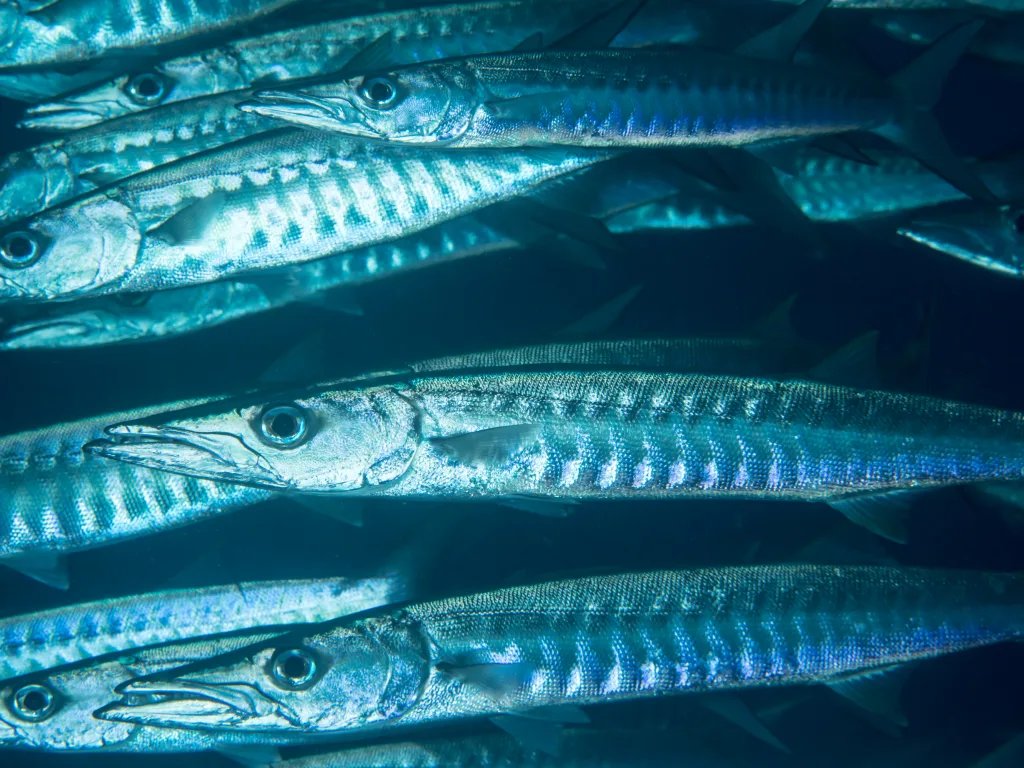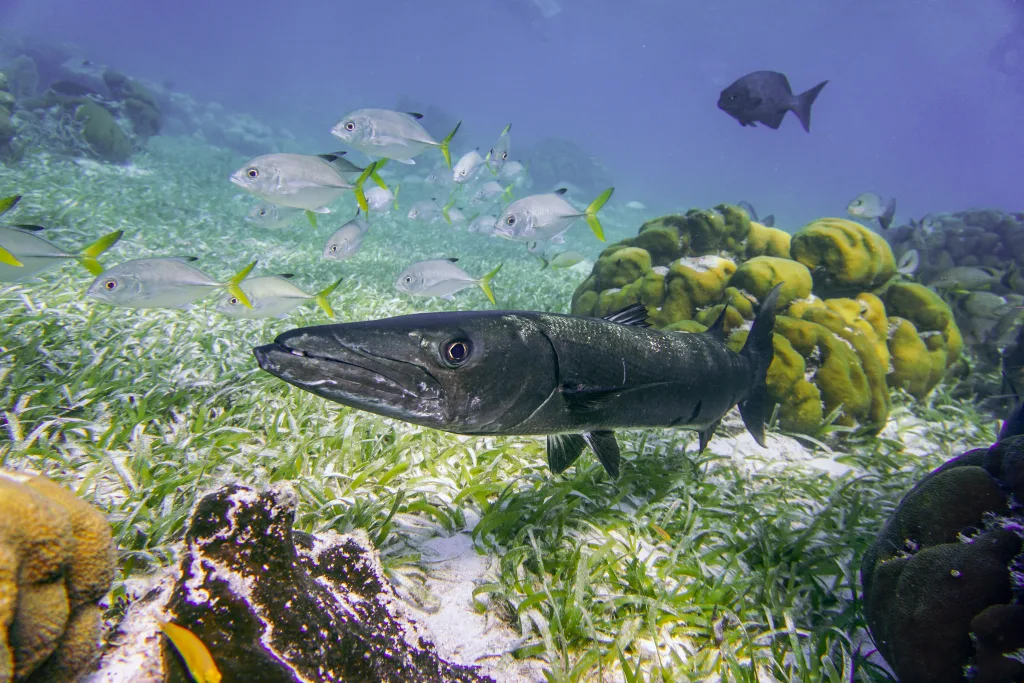Many people wonder if barracudas are dangerous. Although they have a fierce reputation, barracudas are actually relatively passive toward humans and seldom stalk divers with the intent to feed. While they can be aggressive in their pursuit of food, there are several ways that you can protect yourself as a diver or snorkeler around these magnificent creatures.
Barracudas are a type of large ray-finned fish found in tropical and subtropical waters worldwide. They typically inhabit shallow coastal areas and coral reefs, where they hunt smaller fish and crustaceans. Although they have sharp teeth and a powerful bite, they rarely attack humans unless provoked.
So, if you come across a barracuda while diving or snorkeling, what should you do? First and foremost, don’t panic! Barracudas may appear intimidating but they’re actually quite curious rather than vicious. If you take the necessary precautions, you can enjoy ther presence without fear of being attacked.
One important precaution to take is to avoid wearing any jewelry in the water that could potentially resemble food to a barracuda. Shiny jewelry may look like an appealing snack to the fish so it’s best to leave it behind on shore before entering the water. Additionally, try not to handle any live bait before jumping into the sea as this can attract hungry barracudas looking for an easy meal.
It’s also important to remember that when it comes to sharks—which many people mistakenly believe look similar to barracudas—they don’t simply float up to their prey and initiate an attack. Sharks will usually approach their prey quickly and with force, often disorienting them with a powerful bite before attacking further. So if you come across any aquatic creature that looks like a shark but behaves differently than what you would expect from one, chances are it is most likely just an inquisitive barracuda.
In conclusion, although barracudas have earned themselves a fearsome reputation through popular culture and media portrayals, these impressive creatures are actually quite harmless when approached responsibly by humans who understand how to interact with them safely in ther natural habitat.
Can Barracudas Pose a Threat to Humans?
Barracudas are generally not considered to be a threat to humans. However, it is possible for a barracuda to injure a human if it feels provoked or threatened. In most cases, this is usually due to mistaken identity as the barracuda mistakes the human for food. It is wise for any person scuba diving or snorkeling around a group of great barracudas to take off any jewelry that could potentially cause them to mistake it for food and attack. Although barracudas rarely attack humans, it is important to take the necessary precautions when in their proximity to avoid potential injury.

What to Do When Encountering a Barracuda
If you encounter a barracuda, don’t panic. Barracudas are curious creatures and not typically aggressive. To reduce the likelihood of an altercation, avoid wearing shiny jewelry when snorkeling and avoid handing fish just before entering the water. While snorkeling, maintain a safe distance from the barracuda and observe it from afar. If the barracuda appears to be approaching you or swimming in a threatening manner, it is best to leave the area immediately.
Are Barracudas More Aggressive Than Sharks?
Barracudas are widely known to be more aggressive than sharks. While sharks may hunt their prey using surprise and speed, barracudas are far more proactive in attacking their prey. They use their powerful jaws and sharp teeth to tear into the flesh of other creatures. Barracudas have been known to attack swimming humans, boats, and even small sharks. In comparison, shark attacks on humans are relatively rare and typically only occur when provoked or mistaken for food. All in all, barracudas are definitely more dangerous and aggressive than sharks in most situations.
Can Barracudas Be Friendly?
Yes, barracudas can be friendly. In fact, they are usually quite curious and inquisitive around humans, but rarely aggressive. Barracudas often approach divers in a passive manner and will occasionally even follow them around for a short time. As long as humans do not make sudden movements or attempt to touch the fish, the barracuda is more likely to remain in the area for an extended period of time. This behavior is especially common with younger barracudas that have yet to develop their more aggressive nature.
Do Barracudas Swim Close to Shore?
Yes, barracudas typically swim close to shore, especially mature individuals. They are often found in coral reefs, seagrasses, and mangroves nearshore, but can also wander into the deeper parts of the open ocean. This is usually done in search of food. Great barracudas have been observed to come as close as 30 meters from the shoreline in some areas.

Are Barracudas a Source of Fear?
Barracudas are large, predatory fish that can be found in the warm, shallow coastal waters of the Atlantic, Pacific and Indian Oceans. While they may seem intimidating at first glance due to teir fang-like teeth and large size, barracudas are actually quite timid and tend to avoid humans. They primarily feed on smaller fish and invertebrates such as shrimp and crabs. In most cases, barracudas pose no threat to humans. However, it is important to be aware of them while swimming in their natural habitats as they have been known to mistake fingers and toes for prey, which can result in a painful bite.
Attraction of Barracudas
Barracudas are mainly attracted to shiny objects resembling the silvery fish they feed on. These objects can include jewelry, watches, and othr items that sparkle in the water. When humans enter the water with these glittering objects, curious barracudas may investigate and mistake them for food sources. To avoid attracting barracudas, it is best to take off any shiny jewelry or clothing before entering the water.
Appearance of a Barracuda Bite
A barracuda bite can be identified by the distinctive crescent-shaped lacerations it leaves on the skin. Dr. Grant Gilmore, senior scientist for Estuarine, Coastal and Ocean Science in Vero Beach, explains that these wounds are caused by the barracuda’s razor-sharp teeth which can quickly slice through flesh. The lacerations may be deep or shallow depending on how aggressively the barracuda is attacking. They typically measure between 1 to 2 inches in length and are characterized by a clean cut rather than a jagged edge. In some cases, thre may also be bruising around the wound due to the force of impact from the barracuda’s bite.
The Speed of a Barracuda
Great barracudas are incredibly fast swimmers, capable of reaching speeds up to 36 mph (58 kph). This speed is remarkable considering teir size, as they can grow to more than 5 feet long and weigh more than 100 pounds. Their streamlined bodies and powerful tails give them the ability to make quick turns and bursts of speed that can surprise even experienced fishermen.
The Most Violent Sea Animal
The most violent sea animal is the box jellyfish. Native to the coastal waters of the Pacific and Indian Oceans, it is one of the most venomous creatures on Earth. The box jellyfish’s tentacles contain a potent neurotoxin, capable of causing excruciating pain and even death in humans. Its sting is so powerful that it can even penetrate through a wetsuit, leaving its victims with severe burns and ulcers. The venom can also cause paralysis, cardiac arrest, respiratory failure, and death within minutes if left untreated. While rarely fatal to humans, its sting is incredibly painful and potentially dangerous.
Do Sharks Prey on Barracudas?
Yes, sharks do eat barracudas. Sharks such as bull sharks, great hammerhead sharks, and tiger sharks have all been known to feed on barracuda. These predators will typically go after smaller adult barracudas, though larger sharks may be capable of taking down larger specimens. In addition to predation, sharks also compete with barracuda for food, which can reduce the number of prey availabe for the fish.
The Bite Force of a Barracuda
The bite force of a barracuda is quite impressive, measuring between 60-70 newtons. This is enough to cut trough its prey with ease, thanks to its three sets of razor sharp teeth. The palatine and lower jaw teeth are adapted to slice through whatever the barracuda chooses as its next meal.
Predators of Barracudas
Yes, barracudas do have predators. As apex predators, adult barracuda are at risk of predation from larger species such as sharks, dolphins, orcas and groupers. Sharks, orcas and groupers are powerful predators that search for barracuda to eat. Dolphins may also hunt barracuda in packs to herd them togther and make them easier to catch. To protect themselves from these predators, adult barracudas often school together in large numbers to make it more difficult for a predator to single out an individual fish.
The Largest Barracuda Ever Caught
The biggest barracuda ever caught on record was an impressive 38.6 kg (85.1 lb) specimen, caught off Christmas Island in the Indian Ocean on 11 April 2002. This impressive catch was well-documented and verified by fisheries experts. Barracuda are well-known for their large size and formidable appearance, making this record catch even more remarkable. It’s a testament to the sheer power and potential of these apex predators that such a large fish could be hauled up from the depths of the Indian Ocean.
Conclusion
In conclusion, barracudas are not generally viewed as dangerous creatures and rarely do they attack humans. However, it is important to be aware of the potential risks and to exercise caution when scuba diving or snorkeling in areas where barracudas are known to reside. It is also wise to avoid wearing any shiny jewelry that could potentially cause a great barracuda to mistake it for food and attack. If you find yourself sharing the sea with a barracuda, remain calm and avoid any sudden movements that may provoke them. While barracudas can be aggressive when hunting for food, they are usually passive towards humans and pose little threat uless provoked or startled.
